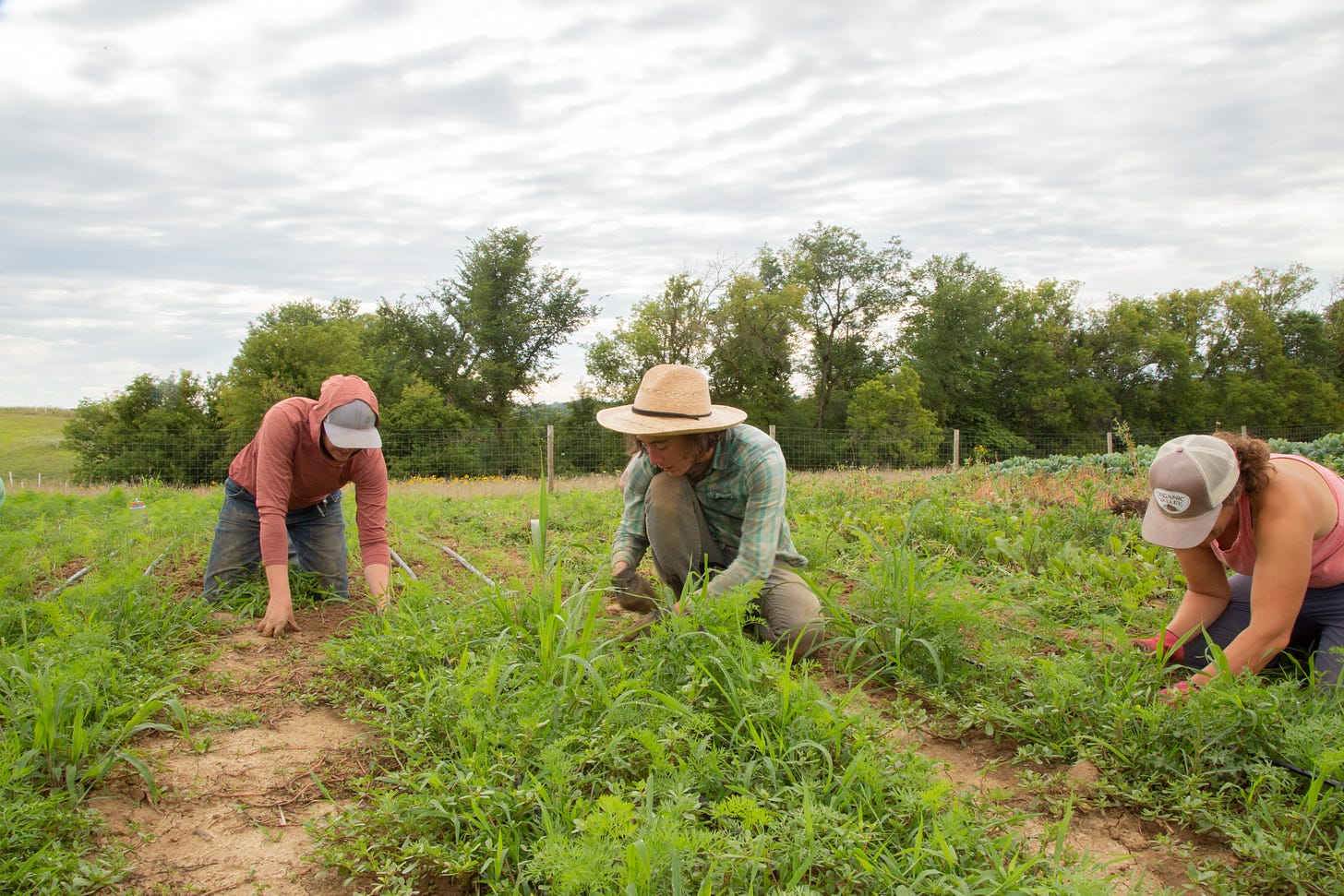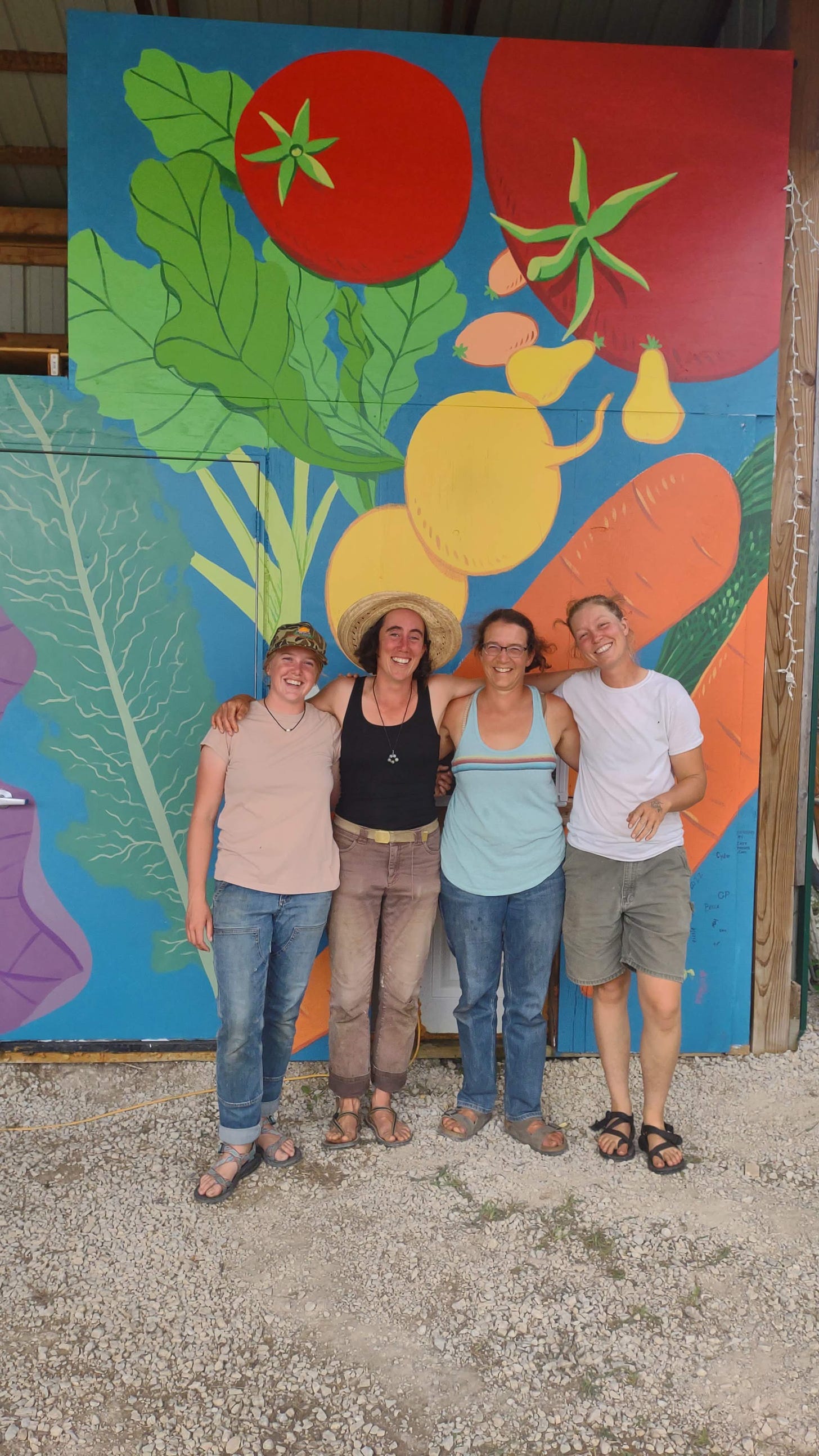Early in our first year of farming together, Emily and I were driving to the greenhouse where we rented space. I was strategizing aloud about something I don’t remember, maybe suggesting an idea for a way we could go about our shared business. Or maybe I was voicing frustration with our economic context. What I do remember is Emily’s response. She said, “I didn’t join this farm to say ‘f ___ you’ to capitalism. I just want to grow vegetables.”
We didn’t know each other all that well at the time, so Emily’s comment took me aback. I had been farming as Humble Hands Harvest on rented land for four years, slowly developing a business, and now Emily had joined the business and we had ownership of a small piece of land where we could grow vegetables long-term. Our brains were in different places. Emily was starting out on her first farm season, while I had been engaged in a years-long struggle to access land that would make long-term sustainability possible for my farm business.
I murmured something like, “I didn’t either… But if we were going to play by the rules of capitalism, our farm couldn’t exist. It’s not about saying ‘f____ you’ to capitalism, it’s about ignoring the rules and making something else possible.”
Fast forward about a year. Emily and I had a growing season under our belts, wanted to commit to farming together for the long term, and were thinking hard about how we wanted to structure our business. We wanted to ensure fairness, and to us that looked like being paid equally for equal amounts of work, even though each of us had different amounts of financial investment in our business. We also wanted to make a process by which new people could join the business. And we wanted a process that would allow either of us to retire without ending Humble Hands Harvest.
We had a friend who had been researching the solidarity economy for years and finding ways to put ideas into action in our small town. When she heard that we were thinking about a business structure, she said, “It sounds like what you want is a worker-owned cooperative.” She led us to some resources, we investigated, and it felt right. We wrote ourselves a cooperative operating agreement.
There are a bunch of cooperatives in Iowa, but not many that are worker-owned. Think producer co-ops, like a farmer’s union grain elevator, or Organic Valley, which are businesses owned by producers that help them market their products. Or consumer co-ops, like my rural electric co-operative, or the food co-op in my town, both owned by the people who buy from them. Both producer and consumer co-ops usually have enough members that they need to be governed by a board of directors, elected from the membership. Our worker-owned co-op, though, only has two member-owners for the time being, and so we are the board and the general managers and, most importantly, the workers.
Long-term, we hope to add more members to Humble Hands Harvest, in order to build capacity and resilience in our business. With enough workers who each know all the different aspects of the business, none of us have to work more than 40 hours per week and we can even take vacations in the summer! Neither Emily nor I am excited about being someone’s boss--we would rather trust our co-farmers to make decisions that are considerate of the needs of the business and of the workers.
So, we’ve developed an on-boarding plan for new members. After two or three years of working for us as an employee, if all parties are in agreement, a person can buy in with $5,500 of equity. They’ll be expected to take part in business decisions like budgeting, and they’ll continue to manage the parts of the operation that they’ve specialized in as an employee. They’ll start taking the salary we pay our worker-owners instead of the wage we pay employees.
Similarly, we have a plan for off-boarding members when they’re ready to retire or leave the business for any other reason. The money that they’ve invested in Humble Hands Harvest is accounted for over the years. That account is converted to a loan to the business, a loan paid back to the retiring member over time.
We’ve developed one small pathway to farm ownership for new farmers in a world that usually requires much more than $5,500 to start a farm business. We would love to see more farm and food businesses on the Iowa landscape that could offer equity and ownership to their workers. The culture of worker ownership strengthens democracy. People who have a say in the way their workplace is run become practiced in active citizenship in other areas of their lives.
And we grow a lot of good vegetables! The work of our farm is mostly about dirty hands, clean produce, living soil, and a local community that eats what we grow. We don’t grow vegetables to thumb our nose at our economic system. And yet, that they get to grow, that we get to do this work and feed our community, has everything to do with the way we work together in defiance of what is expected of farm businesses under capitalism.
Hannah Breckbill co-owns Humble Hands Harvest, a worker-owned cooperative farm in the Driftless region of Northeast Iowa growing organic vegetables, pastured pork, and grass-fed and finished lamb. She’s passionate about sustainable land tenure for young and beginning farmers, hosts a Queer Farmer Convergence on her farm, organizes for local resilience to climate chaos, plants perennials, and is eager to build power with other farmers.
Please consider a paid subscription to Mary Swander’s Emerging Voices. The funds pay the writers for their commentaries.
Listen to my Buggy Land interview with Hannah Breckbill:
Please check out the columns by my brilliant Iowa Writers Collaborative colleagues:





Inspiring!